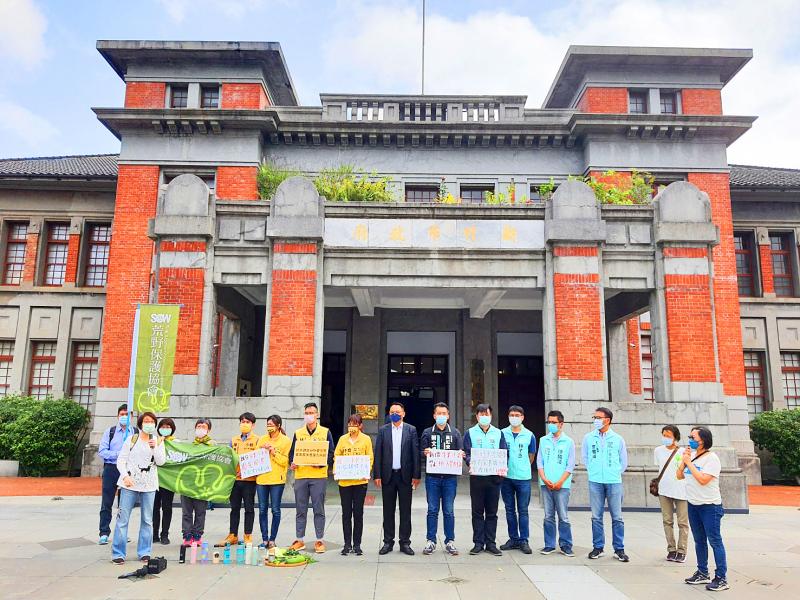The Hsinchu City Council yesterday passed the Hsinchu City Ordinance on Wastewater Discharge Management (新竹市廢水及污水排放管理自治條例), following a referendum last year on the issue.
The referendum on Dec. 18 last year passed with 131,816 yes votes on the question: “Do you agree that the Hsinchu City Government should draft a wastewater management ordinance that would clearly state that industrial, medical and wastewater from other sources should be collected by a dedicated pipeline, the outtake of which should not empty into the intake areas of potable water or upstream of irrigation water intakes?”
The city government yesterday said it had met with local groups, as well as local branches of the Irrigation Agency, to discuss how best to draft the legislation and address the majority view reflected in the referendum.

Photo: Hung Mei-hsiu, Taipei Times
The ordinance seeks to separate drinking water, water used for irrigation and wastewater, the city government said, adding that it is considering civic groups’ suggestions to set up an oversight committee, which would include experts, local groups and city government officials as members.
The city mayor would chair the committee and a meeting would be convened every six months, with extraordinary meetings being held when necessary, an addendum says.
The regulatory details for the establishment of the said committee should be reviewed and ratified by the city council, the addendum says.
Outside Hsinchu City Hall, the Taiwan Clear Water Action Alliance held a rally calling for separate pipes to be set up for industrial waste, medical waste and wastewater produced by other means.
The alliance added that these pipes should not empty into intake areas for potable water or upstream of irrigation water intakes.
The government should start by tackling industries and businesses found to be dumping wastewater, the alliance said, while calling for the establishment of a clause that would allow the city government to file claims to recover illegal gains.

Alain Robert, known as the "French Spider-Man," praised Alex Honnold as exceptionally well-prepared after the US climber completed a free solo ascent of Taipei 101 yesterday. Robert said Honnold's ascent of the 508m-tall skyscraper in just more than one-and-a-half hours without using safety ropes or equipment was a remarkable achievement. "This is my life," he said in an interview conducted in French, adding that he liked the feeling of being "on the edge of danger." The 63-year-old Frenchman climbed Taipei 101 using ropes in December 2004, taking about four hours to reach the top. On a one-to-10 scale of difficulty, Robert said Taipei 101

A preclearance service to facilitate entry for people traveling to select airports in Japan would be available from Thursday next week to Feb. 25 at Taiwan Taoyuan International Airport, Taoyuan International Airport Corp (TIAC) said on Tuesday. The service was first made available to Taiwanese travelers throughout the winter vacation of 2024 and during the Lunar New Year holiday. In addition to flights to the Japanese cities of Hakodate, Asahikawa, Akita, Sendai, Niigata, Okayama, Takamatsu, Kumamoto and Kagoshima, the service would be available to travelers to Kobe and Oita. The service can be accessed by passengers of 15 flight routes operated by

Taiwanese and US defense groups are collaborating to introduce deployable, semi-autonomous manufacturing systems for drones and components in a boost to the nation’s supply chain resilience. Taiwan’s G-Tech Optroelectronics Corp subsidiary GTOC and the US’ Aerkomm Inc on Friday announced an agreement with fellow US-based Firestorm Lab to adopt the latter’s xCell, a technology featuring 3D printers fitted in 6.1m container units. The systems enable aerial platforms and parts to be produced in high volumes from dispersed nodes capable of rapid redeployment, to minimize the risk of enemy strikes and to meet field requirements, they said. Firestorm chief technology officer Ian Muceus said

MORE FALL: An investigation into one of Xi’s key cronies, part of a broader ‘anti-corruption’ drive, indicates that he might have a deep distrust in the military, an expert said China’s latest military purge underscores systemic risks in its shift from collective leadership to sole rule under Chinese President Xi Jinping (習近平), and could disrupt its chain of command and military capabilities, a national security official said yesterday. If decisionmaking within the Chinese Communist Party has become “irrational” under one-man rule, the Taiwan Strait and the regional situation must be approached with extreme caution, given unforeseen risks, they added. The anonymous official made the remarks as China’s Central Military Commission Vice Chairman Zhang Youxia (張又俠) and Joint Staff Department Chief of Staff Liu Zhenli (劉振立) were reportedly being investigated for suspected “serious